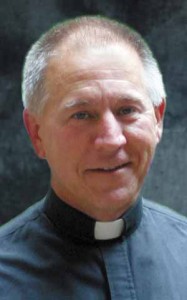By Fr. Bud Grant

Recently, here in Iowa, a vice presidential candidate quipped that “rights don’t come from the government; they come from God and nature.” This reminded me that Natural Law remains a powerful intellectual argument, even if often badly understood and too casually claimed.
Natural Law is, first, the assertion that the universe is governed by a set of inviolable laws. These are not moral laws but rather laws of nature discerned by using reason with acuity and precision, such as do scientists who have demonstrated beyond reasonable doubt that climate change is real and anthropogenic.
Natural Law is, secondly, the argument that good women and men, regardless of where or when they have lived — and presuming the best use of moral reasoning — would agree to certain universal ethical truths. The most basic of these truths is, to cite Thomas Aquinas, “do good and avoid evil” (ST I.II.94.4). Implicit in this principle are two other universals. First, the well-informed individual moral conscience is the supreme authority in ethical matters and no government, military, economic power, social norm, or even religion can coerce anyone to violate that conscience. Second, the individual is a part of a community the good of which outweighs that of the individual.
Finally, Aquinas believes profoundly that the deepest aspirations of the human soul and the most powerful moral impulses are toward faith — surrendering one’s own dreams; hope — believing that God will catch us; and caritas — that we are fulfilled by dying to self for love of God and all God’s creation.
You will notice that this summary does not exactly offer specific moral counsel on addressing the social, economic, cultural, political and environmental issues of our day. No, it does not. It cannot. It ought not to try. That is the sovereign responsibility only of the well-informed individual moral conscience, as is explicitly explained in the document you probably received recently as a parish bulletin insert entitled “Forming Consciences for Faithful Citizenship.” Applying the great truths of Natural Law to contemporary issues ought to be done with humility because we are all too prone to manipulate it to sanction what we already want to do (this applies both to individuals and institutions, by the way). This is why we should be guided (never compelled) by the wisdom of our inherited Catholic intellectual tradition before we make decisions.
But if it doesn’t give me “The” answer, what use is Natural Law? Why is it still a potent source of moral suasion, despite the entrenched hegemony of morally subjective existentialism? Because it claims universal truth while yet being adaptable to the constantly changing moral environment. Exquisite, really. And yet, though necessary, Natural Law is insufficient for moral decision making. This crucial point is ignored by those who too casually toss around the vocabulary of Natural Law in order to lend their predisposed positions a veneer of legitimacy, but they should re-read their Thomas.
Aquinas insists that Natural Law must be wrestled with, worked at, and practiced diligently. The result is, get this, the mature moral character, using the now quaint sounding term “virtue” (Latin: “habitus”). The disciplined practice of Natural Law results in “habits” of doing good and avoiding evil, constituting a well-formed and informed moral character. Ultimately, Catholic moral theology is crafted, not so much in Natural Law per se, but in the cardinal virtues of prudence, temperance, justice, and courage and the theological virtues of faith, hope and self-sacrificial love. Forged in natural law, molded by the crucible of lived experience, grounded in Tradition, informed by God-given reason and infused by the grace of God, the mature moral Catholic is a person of character whom we can trust to do good, to put herself at the service of all out of a sense of duty to our God.
(Father Bud Grant is an assistant professor of theology at St. Ambrose University in Davenport.)







